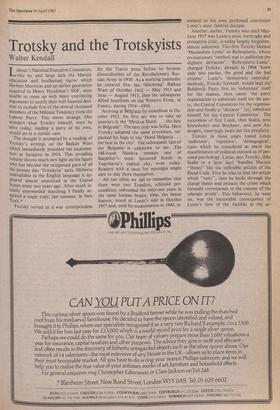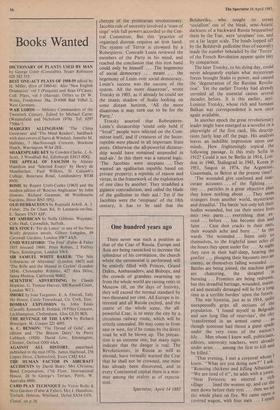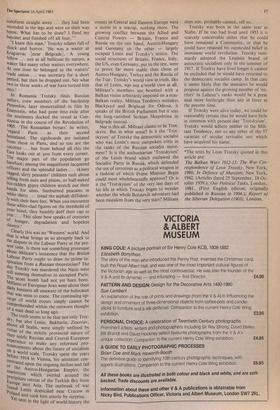Trotsky and the Trotskyists
Walter Kendall
Labour's National Executive Committee, who by and large lack the Marxist education and intellectual rigour which Herbert Morrison and an earlier generation acquired in Henry Hyndman's SDF, seem unable to come up with many convincing arguments to justify their half-hearted deci- sion to exclude five of the several thousand members of the Militant Tendency from the Labour Party. This seems strange. One wonders what Trotsky himself, were he alive today, leading a party of his own, would do in a similar case.
The thought is prompted by a reacting of Trotsky's writings on the Balkan Wars Which . immediately preceded the assassina- tion at Sarajevo in 1914. This revealing volume throws much new light on the figure who has become the recognised guru of all the present day 'Trotskyist' sects. Hitherto unavailable in the English language it ap- peared almost unnoticed in the United States some two years ago. After much in- itially unrewarded searching I finally ac- quired a single copy, last summer, in New York.* Trotsky served as a war correspondent
for the Tsarist press before he became Generalissimo of the Revolutionary Rus- sian Army in 1918. As a working journalist he covered first the 'blitzkrieg' Balkan Wars of October 1912 — May 1913 and June — August 1913, then the subsequent Allied hostilities on the Western Front, in France, during 1914-1916.
Arriving at Belgrade by steamboat in Oc- tober 1912, his first act was to take up quarters in the 'Moskva Hotel ... the best in Belgrade'. The next stop was Sofia. Here Trotsky adopted the same procedure, un- packed his bags in the 'Hotel Bulgaria ... the best in the city'. The subsequent fate of the Bulgaria is unknown to me. The 148-room Moskva remains one of Baedeker's most favoured hotels in Yugoslavia's capital city, even today. Readers with a taste for nostalgia might care to stay there themselves.
All too often we fail to remember that there were two Trotskys, schizoid per- sonalities, subsumed for sixty-one years in the same human breast. One, the better known, stood at Lenin's side in October 1917 and, until his assassination in 1940, re-
mained to his own profound conviction Lenin's most faithful disciple.
Another, earlier, Trotsky who until May- June 1917 was Lenin's most forthright and perceptive critic, is today largely forgotten, almost unknown. This first Trotsky likened `Maximilien Lenin' to Robespierre, whose revolutionary 'method was to guillotine the slightest deviation'. 'Robespierre-Lenin', charged Trotsky, already in 1904 'knew only two parties, the good and the bad citizens'. Lenin's 'democratic centralist' methods, Trotsky foretold, would lead the Bolshevik Party first to 'substitute' itself for the masses, then cause 'the party organisation to substitute itself for the par- ty, the Central Committee for the organisa- tion and finally a "dictator" [to] substitute himself for the Central Committee'. The succession of first Lenin, then Stalin, next Khrushchev and Brezhnev, and now An- dropov, unerringly bears out this prophecy.
Trotsky in these years found Lenin 'malicious', 'repulsive', 'demagogical', traits which he considered as much the manifestation of political outlook as of per- sonal psychology. Lenin, says Trotsky, (like Stalin in a later day) 'handles Marxist "theses" like the inflexible articles of the Penal Code. First he tries to find the article which "suits", then he looks through the charge sheets and extracts the crime which formally corresponds to the content of the relevant article'. This behaviour, he went on, was the inexorable consequence of Lenin's view of the Jacobin as the ar-
chetype of the proletarian revolutionary. Jacobin rule of necessity involved a 'state of siege' with full powers accorded to the Cen- tral Committee. But this 'practice of organised distrust requires an iron hand. The system of Terror is crowned by a Robespierre. Comrade Lenin reviewed the members of the Party in his mind, and reached the conclusion that this iron hand could only be himself . ,. The hegemony of social democracy ... meant ... the hegemony of Lenin over social democracy. Lenin's success was the success of the system. All the more disastrous', wrote Trotsky in 1903, as if already he could see the titanic shadow of Stalin looking on some distant horizon, 'All the more disastrous it may turn out to be for the Party.'
Trotsky asserted that Robespierre- Lenin's dictatorship 'could only hold if "loyal" people were selected on the Com- mittee itself, and if creatures of the Incor- ruptible were placed in all important State posts. Otherwise the all-powerful dictator- ship would have remained suspended in mid-air.' In this there was a natural logic. 'The Jacobins were utopians ... They wanted an egalitarian republic based on private property; a republic of reason and virtue, in the framework of the exploitation of one class by another. They straddled a gigantic contradiction, and called the blade of the guillotine to their aid.' Yet if the Jacobins were the 'utopians' of the 18th century, it has to be said that the Bolsheviks, who sought to create 'socialism' out of the bleak, semi-Asiatic darkness of a backward Russia bequeathed them by the Tsar, were 'utopians' too, and on a far larger scale. The heads lopped off by the Bolshevik guillotine thus of necessity made the number beheaded by the 'Terror' of the French Revolution appear quite tiny by comparison.
The later Trotsky, to his dying day, could never adequately explain what mysterious forces brought Stalin to power, and caused the 'degeneration of the Russian Revolu- tion'. Yet the earlier Trotsky had already unveiled all the essential causes several decades before. It is this earlier, anti Leninist Trotsky, whose rich and humane Balkan war correspondence is now once again available.
In another epoch the great revolutionary leader might have emerged as a novelist or a playwright of the first rank. His descrip- tions fairly leap off the page. His analysis leaves an indelible impression upon our minds. How frighteningly topical the following passage. Is this truly Sofia in 1912? Could it not be Berlin in 1914, Lon- don in 1940, Stalingrad in 1943, Korea in 1951, Saigon in 1974, the Argentine, Guatemala, or Beirut at the present time?
'The wounded give confused and inac- curate accounts ... of the fighting . -- tiny ... particles in a great objective plan they know nothing about ... They seem strangers from another world, mysterious and dreadful.' The battle 'not only left their bodies wounded, but cut their entire lives into two parts ... everything that ex- isted ... before ... has become dim and faint ... Case shot cracks in their ears, their wounds ache and burn ...' In the wards 'the wounded ... listen only to themselves, to the frightful inner echo of the hours they spent under fire ... At night they rave in their half-sleep, hearing the gunfire ... plunging their bayonets into an enemy, or themselves falling wounded • • • Battles are being joined, the machine guns are chattering, the shrapnel is bursting ... Frontiers are being redrawn, but this dreadful heritage, wounded, maim- ed and mentally deranged will lie for a long time as a terrible burden' upon the future. The war hysteria, just as in 1914, quite unexpectedly grips all sections of the population. 'I found myself in Belgrade and saw long files of reservists', the city 'transformed in an armed camp • • • as though someone had thrust a giant spade under the very roots of the nation's life... Men whom I knew well, politicians, editors, university teachers, were alreadY under arms ... among the first to kill and be killed.'
'That evening, I met a corporal whom I know. "What are you doing now?" I ask. "Roasting chickens and killing Albanians. "We are tired of it", he adds with a yawn. "Near Ferizovic we entered a rich village ... lined the women up, and cut the men down before their eyes ... then we set the whole place on fire. We came upon a covered wagon, with four men ... I smelt iodoform straight away ... they had been wounded in the legs and were on their way home. What has to be done? I fixed my bayonet and finished off all four."
'I knew this man,' Trotsky relates full of Shriek and horror. 'He was a waiter at Kraguevac [near Belgrade]. A young fellow ... not at all bellicose by nature, a waiter like many other waiters everywhere. At one time he belonged to the waiters, trade union ... was secretary for a short Period, but then he dropped out. See what two or three weeks of war have turned him into.'
In Romania Trotsky finds Russian sailors, crew members of the battleship Potemkin, later immortalised in film by Eisenstein, who had gone into exile after the mutineers docked the vessel at Con- stantsa in the course of the Revolution of 1905. 'The Romanian boyars' he writes,
'regard Paris ... as their second homeland. The signboards are imitated from those in Paris, and so too are the cocottes ... but from behind all this the East looks out at you from every corner. The major part of the population go barefoot; among the magnificent lacquered Officers and the splendid ladies ... skinny ragged, dirty peasants' children rush about selling fresh nuts and plums, or half-naked lice-ridden gypsy children stretch out their hands for alms. Sunburned peasants in White shirts ... tread the asphalt diffident- ly with their bare feet. When you encounter these white-clad figures on the threshold of Your hotel, they humbly doff their cap to You ... This silent bow speaks of centuries of hunger, degradation and hopeless slavery.'
Clearly this was no 'Western' world. And that is what brings us so abruptly back to the dispute in the Labour Party at the pre- sent time. Is there not something grotesque about Militant's insistence that the British Labour Party ought to draw its prime in- spiration from a Russian theoretician? The day Trotsky was murdered the Nazis were Still sunning themselves in occupied Paris. The atom bomb had not yet been born. Millions of European Jews went about their daily business all unaware of the holocaust that was soon to come. The continuing up- surge of world events simply cannot be comprehended within the outworn thought of a man dead so long ago.
The truth seems to be that not only Trot-
sky, but also Lenin, Bukharin, Zinoviev, above
Virtue of Stalin, were simply unfitted by irtue of the strictly provincial nature of
heir solely Russian and Central European experience to make any informed pro- nouncements about the future of socialism on n a world scale. Trotsky spent the years before 1914 in Vienna, his attention con- centrated upon the ongoing decline and fall of the Austro-Hungarian Empire, the maelstrom which swirled around the Precipitate retreat of the Turkish Bey from Europe into Asia. The outbreak of war Lound Lenin domiciled near Cracow in Poland and took him utterly by surprise.
Yet seen in the light of world history the events in Central and Eastern Europe were a storm in a teacup, nothing more. The growing conflict between the Allied and Central Powers — Britain, France and Russia on the one hand, Austro-Hungary and Germany on the other — largely escaped Lenin and Trotsky's notice. The social structures of Britain, France, Italy, the US, even Germany, put to the test, were to prove far more stable than those of Austro-Hungary, Turkey and the Russia of the Tsar. Trotsky's world view in truth, like that of Lenin, was not a world view at all. Militant's members are besotted with a Balkan vision arbitrarily imposed on a non- Balkan reality. Militant Tendency mistakes Blackpool and Brighton for Odessa, it speaks of the British Parliament but it sees the long-vanished Serbian Skupshtina in Belgrade instead. Nor is this all. Militant claims to be Trot- skyist. But in what sense? Is it the 'Trot- skyism' of Trotsky the democratic socialist who was Lenin's most outspoken critic in the ranks of the Russian socialist move- ment? Is it the authoritarian 'Trotskyism' of the Lenin brand which outlawed the Socialist Party in Russia, which defended the use of terrorism as a political weapon in a fashion of which Prime Minister Begin could most wholeheartedly approve? Or is it the 'Trotskyism' of the very last days of his life in which Trotsky began to wonder whether the whole Bolshevik adventure had been mistaken from the very start? Militant does not, probably cannot, tell us.
Trotsky was born in the same year as Stalin. If he too had lived until 1953 it is scarcely conceivable either that he could have remained a Communist, or that he could have retained his outmoded belief in imminent world revolution. Trotsky sum- marily adopted the Leninist brand of autocratic socialism only in the summer of 1917. If Trotksy have lived longer it cannot be excluded that he would have returned to the democratic socialist camp. In that case it seems likely that the measures he would propose against the growing number of 'en- trists' in Labour's ranks would be a great deal more forthright than any in force at the present time.
If Trotsky were alive today, we could be reasonably certain that he would have little in common with present-day 'Trotskyism'. Trotsky would adhere neither to the Mili- tant Tendency, nor to any other of the 57 varieties of secular revivalist sect which have acquired his name.
*The texts by Leon Trotsky quoted in this article are:
The Balkan Wars 1912-13: The War Cor- respondence of Leon Trotsky. New York, 1980; In Defence of Marxism, New York, 1942. (Articles dated 25 September, 18 Oc- tober 1939.); Our Political Tasks, London, 1981. (First English edition; originally published in Russian in 1904.); Report of the Siberian Delegation (1903), London.












































 Previous page
Previous page